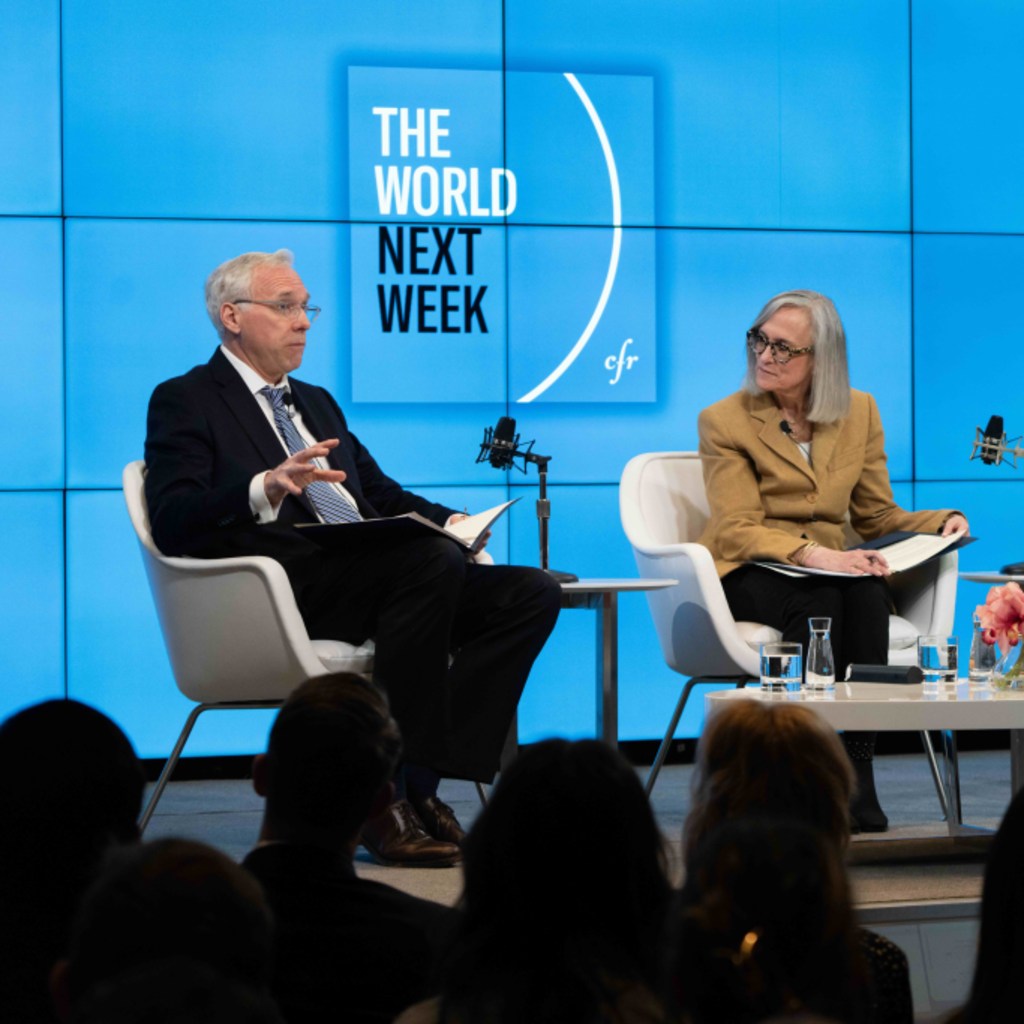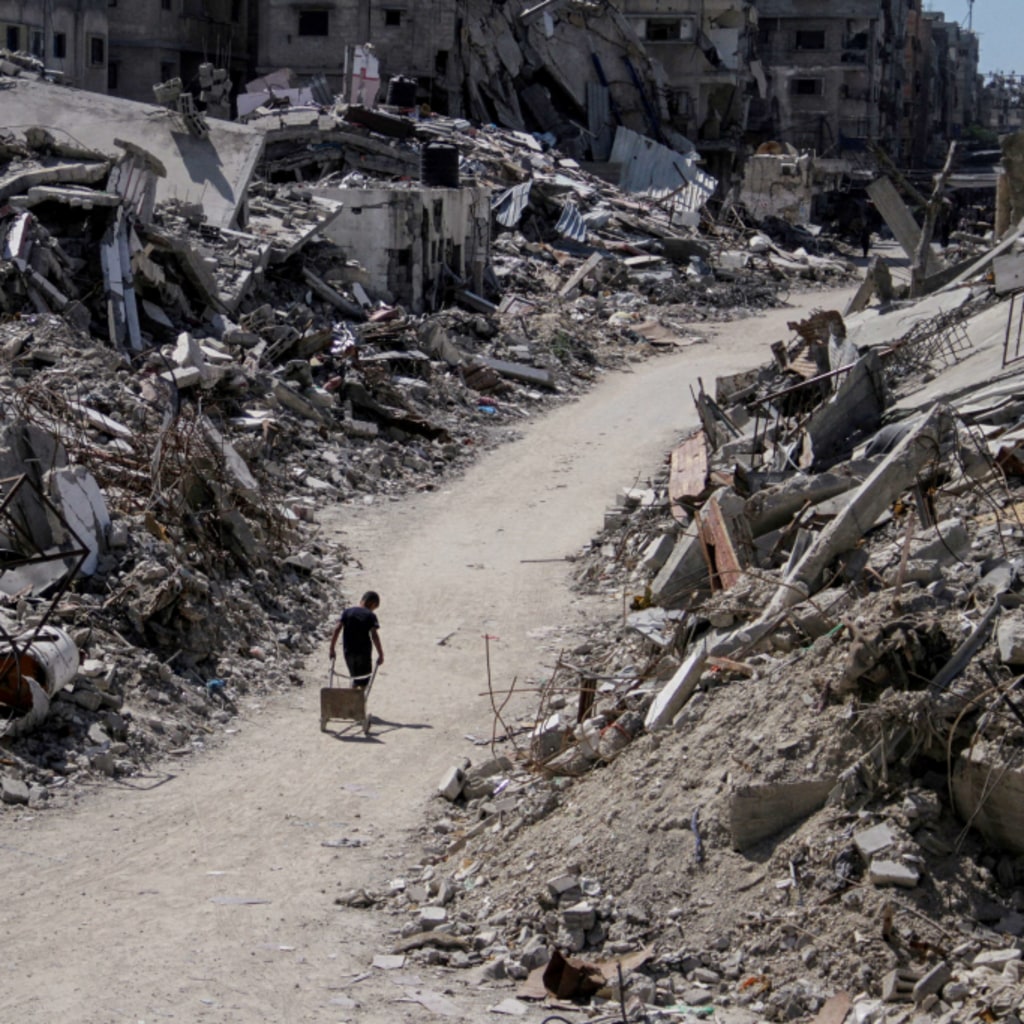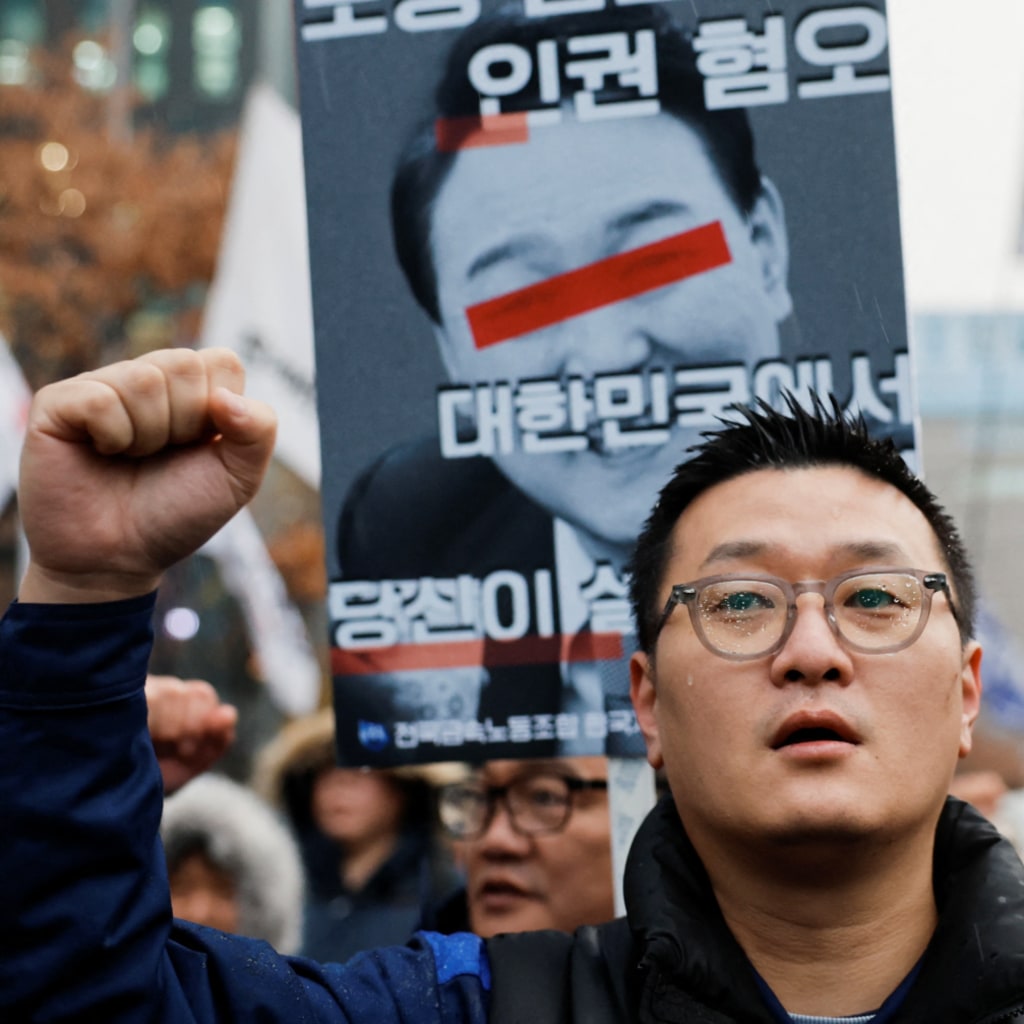Diplomacy Intensifies With Israel-Hamas War, UK’s AI Safety Summit, China’s Foreign Minister Visits Washington, and More
Diplomatic contacts surge ahead of anticipated escalation in the Israel-Hamas war; the United Kingdom (UK) hosts its first artificial intelligence (AI) Safety Summit to develop strategies that mitigate the risks of AI; Chinese Foreign Minister Wang Yi arrives in Washington, DC to speak with U.S. Secretary of State Antony Blinken and U.S. National Security Adviser Jake Sullivan; and Pakistan’s former Prime Minister Imran Khan possibly faces the death penalty.
Published
Hosts
- Robert McMahonManaging Editor
- Carla Anne RobbinsSenior Fellow
Associate Podcast Producer
- Ester FangAssociate Podcast Producer
Editorial Director and Producer
- Gabrielle SierraDirector, Podcasting
Show Notes
Mentioned on the Podcast
“The Future of the Israel-Hamas War, With Linda Robinson,” The President’s Inbox
Transcript
MCMAHON:
In the coming week, diplomatic efforts intensify around the Israel-Hamas war, the UK hosts the AI Safety Summit, and China’s foreign minister Wang Yi visits Washington. It’s October 26th, 2023 in time for The World Next Week.
I’m Bob McMahon.
ROBBINS:
And I’m Carla Anne Robbins. So Bob, let’s start again with the Israel-Hamas War and this week Hamas released four hostages and Israel finally allowed in a limited number of trucks carrying food and medicine from Egypt. But the death toll in Gaza continues to rise and a growing number of countries are calling for if not a ceasefire, humanitarian pause. That’s what the EU is talking about to get aid in. Do you see any sign that these Israelis are open to diplomatic proposals?
MCMAHON:
Not necessarily. I mean, it depends on what the diplomatic proposals contain, but there’s a pattern here, which is that there is a strenuous attempt wherever meetings are taking place, and let’s just cite the UN Security Council, for example, to just declare a ceasefire once and for all and then get aid moving in, calm things down and so forth. The Israelis... This is still less than three weeks since the attacks occurred. They are very keen to do what they’ve sworn to do since the beginning of this campaign, which is eradicate Hamas. And they see these delays as only helping Hamas in able to squirrel away weapons, regroup, generate further support and so forth. And so they want to get in there and they have vowed various Israeli leaders in recent days about there’s going to be a land campaign, it’s going to happen, and they’re going to go and eradicate Hamas.
Now, there’s all sorts of commentary about the ability to actually eradicate Hamas and what blow back such a campaign can cause and so forth. But in terms of your original question, what the Israelis want to do, this is for them existential and they want to go in after Hamas. It’s also worth pointing out a new statement that was reported from Hamas, from Hamas spokesman in Lebanon, I believe, before this podcast taping started, that asserted that what happened on October 7th was a military operation that Hamas was carrying out an intended military campaign and that it acted on its own volition and not in collusion with any country or nation state.
I think it’s worth pointing that out in part because it could indicate Hamas trying to make sure that it seizes some narrative high ground with public opinion as we approach potential Israeli ground campaign in Gaza. But we also shouldn’t lose sight of the fact that are many, many reports and actual footage of the brutality of the Hamas attack and going after individuals who are clearly citizens in horrific ways. But I just think it’s worth noting that Hamas statement.
ROBBINS:
It’s really hard to imagine them seizing the narrative high ground with a statement like that.
MCMAHON:
I know. Now the Security Council and the UN in general has been a growing for debate, and very heated debate I should say. The next thing that’s coming up is tomorrow the UN General Assembly is holding a vote on a draft resolution put forward by Arab states that calls for a ceasefire. General Assembly resolutions are non-binding. There is a bit of political weight they carry, as we’ve seen in other such votes, for example, regarding Russia’s invasion of Ukraine and so forth. And so that will play out tomorrow.
This comes after a week in which there were double veto of resolutions, competing resolutions by Russia and the United States. Russia wanted to have a full-fledged ceasefire declared in its resolution. The United States had a more carefully worded resolution put forward to allow for measures including a humanitarian pause to allow aid. So not declaring ceasefire, but that had moved a bit from the U.S. original position. So more work to be done. There’s supposed to be a number of Security Council, non-permanent members. The ten members that don’t have the veto power apparently are working on a new draft that they, I guess will come up with by next week according to some of the reports that have come out of the UN. So that’s some of the diplomacy, but you have high temperature conversations and declarations going on, certainly in the Middle East.
Just this week, another one came from Turkey’s president Recep Tayyip Erdoğan, who had been dealing with a bit of a rapprochement with Israel after some rough going in recent years. But he came out very strongly in support of Palestinians and also went as far as praising Hamas as what he said were “liberators” who are fighting to protect their lands and people. And he’s expected to attend a pro-Palestinian rally in Istanbul scheduled for Saturday, and that’s organized by his governing Justice and Development party.
So that’s Turkey. Turkey at one point was thought to have been a country that could have played a brokering role in this. I don’t see that happening. Other countries in the region are strenuously calling for a ceasefire. The U.S. is working also strenuously to try to both support Israel and contain a situation from getting out of control. As we’ve discussed previously, Carla, there’s also concern about another front opening up between Israel and Hezbollah in the north on the Lebanese border and battles involving Iranian proxies that could launch weapons against U.S. forces stationed in places like Syria and Iraq.
ROBBINS:
There’s a lot of diplomacy, but the Israelis have a long history. Certainly they are not big fans of the UN General Assembly, so I don’t think they’re going to spend a lot of time paying attention to-
MCMAHON:
No, that’s true.
ROBBINS:
... the people who declared Zionism as racism and Arab League, obviously not going to pay attention to them. Do we have any sense of whether any of these fora have resonance inside of Israel? I mean, the EU has yet to come out with an agreement, but they’re pushing within the EU to call for some pause. We know the U.S. behind the scene has been pressing for a delay at a minimum of this ground invasion and delay to allow civilians to move southward and delay so that the U.S. can get missile defenses in place to protect U.S. troops and bases around the region. Any sense that within Israel itself that there’s a resonance because really this diplomatic action going on around doesn’t seem to really involve the Israelis themselves. Who do they listen to?
MCMAHON:
No, I think it’s pretty clear the U.S. is the main party, and even then you’ve had Israeli officials, I think as the Israeli President Herzog saying, “Of course the U.S. is an important partner, but we don’t take our marching orders in terms of launching a ground assault from the United States in this regard,” I think from what I’ve seen, there’s still very much concern on the Israeli side that they need to act sooner rather than later.
And again, the U.S. is the paramount country of influence. They have been extremely grateful for the expressions of support, really strong expressions of support from President Biden, but also they’re getting by most accounts, a pretty steady messaging from the United States. Also, about the need to be mindful of the humanitarian impact here. And again, the tolls continue to mount in Gaza. The ability of people in Gaza to be able to get safety, safe drinking water, food and so forth is still in doubt at this point. There had been that Israeli order to evacuate the north of Gaza, and there’s certainly been a large population flight within Gaza, but I think there is going to be a little bit more waiting going on, but it does still feel really inevitable that there’s going to be a ground campaign and then we’ll have to see what happens there.
You’re even getting messaging from the Biden administration, like basically saying, “After whatever happens happens, we need to start seriously talking about a two-state solution between Israelis and the Palestinians.” So that’s something that’s acknowledging potentially a rebooting of a diplomatic effort that’s hard to actually focus on at this point, given what’s imminently going on.
And we should note the UN is yes, it’s not a favored forum for the Israelis, certainly in the General Assembly where there has been any number of controversial resolutions passed over the decades, but even the humanitarian officials are coming in for criticism and UN Secretary-General Guterres who has been speaking out strongly in favor of supporting the humanitarian pause because the UN is the major agency on the ground there and is reporting a really dire situation. So it’s a really difficult situation right now, Carla, and I think we’re bracing for what’s to come in a short period of time, given the reasons you cited in terms of humanitarian and the U.S. bolstering of defense forces could still be a number of days before that happens, but I don’t think it’s going to be that much longer.
And then we see whether the Israelis do a full-fledged invasion or what sort of campaign they launch. Obviously, they’re not going to show all their cards and say what they’re doing, but they’re expected to face really difficult terrain. And I would note our affiliate podcast, President’s Inbox had an interesting discussion with our colleague Linda Robinson this week about what urban fighting amounts to, and in terms of all the tunnels that are located in Gaza, the way that Hamas fighters could move from building to building, could booby trap narrow streets and it’s incredibly densely built up and populated area even after all the bombing that’s taken place. So we’re looking at a really difficult time period ahead, I think.
ROBBINS:
Indeed.
MCMAHON:
Carla, not to be overlooked in the coming week also though is an important global meeting on AI or artificial intelligence, or should I say generative AI, which seems to be the real focal point here. Next Wednesday, the United Kingdom will host its AI Safety Summit. The goal there is to develop best practices for managing risks of AI and especially the bad actors out there who would use AI for all sorts of dangerous, both economic and military actions potentially. With Silicon Valley executives and government officials taking part, is there a chance that this summit could lead to some major action and consensus?
ROBBINS:
Well, Bob, it seems like every few months, another leader in the field of AI is warning, “Please stop us before we kill again,” warning that this technology could unleash the apocalypse. And most recent quote I’ve seen is from the CEO of the AI firm Anthropic who said that the chances of an AI system going catastrophically wrong on the scale of human civilization was somewhere between 10 and 25 percent, which are not odds that I like. And they’re really very legitimate concerns on what AI could do.
Everything from creating disinformation to designing bio weapons, to enabling mass surveillance, to putting us all out of work and becoming our robot overlords. And so Rishi Sunak, the PM of the UK, has decided, and keep in mind that they are not one of the major players in AI right now. He’s decided that he wants to become a major player in AI safety and you have to welcome serious efforts by politicians who are trying to figure out some limits or guardrails. And Sunak has declared his goal is for the UK to become what he calls “the geographical home of global AI safety regulation.”
But whether this is a meeting that’s going to accomplish that, I’ve heard a lot of skepticism from people say it won’t go far enough to ban the most advanced AI until we figure out its destructive potential, which is what some people want. And other people say it’s going to be far too focused on the doomsday scenarios while ignoring how you can productively leverage AI and focus on what safety we really need.
But no doubt that this is a hot ticket. We didn’t get invited to the state dinner. I don’t think we’ve been invited to this one either, Bob. Sunak has invited a hundred people to Bletchley Park. That’s the estate where the World War II cryptographers cracked the Nazi Enigma code, which is sort of cute, and the guest list hasn’t been formally announced, but it’s going to include tech executives, some civil society leaders and government officials, U.S. Secretary of Commerce, Gina Raimondo is going, and we hear that Vice President Kamala Harris is going and there’s a Chinese delegation going. Sunak confirmed that today, which I gather is only going to come for part of the meeting, and that U.S. officials were not happy about that invitation, although it makes an enormous amount of sense because the U.S. and China are the big leaders in this space.
So what’s going to come out of it? Sunak is expected to pitch a voluntary global registry of large AI models, but that’s going to depend on the U.S. and Chinese tech companies willing to share proprietary tech so people can look under the hood. A lot of people are very skeptical about that. He’s going to create an AI safety institute. He’s talking about bringing together a bunch of experts to do it. So I think it’s more a talk shop, but not a bad thing to do. There’s also a lot of regulatory action that’s going on in parallel, and we could talk about that as well, including a rollout from the Biden administration on Monday of a new executive order on AI.
MCMAHON:
Yeah, that last part I think is going to create some special ballast for this summit. So I’m looking forward to seeing that. I think it’s also interesting to see who is coming because things are so new in this front, and it’d be interesting to see who the Chinese end up sending, for example, and what other government officials are going to take the lead in this because it has all sorts of applications. It’s a safety, but it’s also a huge business opportunity and a huge opportunity in other areas. So yeah, as I said at the outset, it seems like a little bit overlooked given everything else going on in the world, but I think we should not lose sight of what’s potentially there.
ROBBINS:
Well, when the guys and gals who are working on this start talking about extinction level potential here, I think we certainly have to pay attention to it. The regulation that they’re talking about an executive order that’s going to come out require advanced AI models to undergo assessments before they can be used by federal workers, which is leveraging the purchasing power of it. White House is going to order federal government agencies reportedly to assess how they might use AI to bolster their cyber defenses. Nobody’s talking about banning this stuff, but using it potentially more carefully.
The EU is much further advanced than we are in adopting regulation. We’ve talked about this before, and they’re very focused on the privacy issues and potential for the surveillance state. There’s lots of things to worry about there, and I don’t know about you if you listen to NPR. I’m constantly hearing from sponsors, “We’re going to use AI to solve all your problems there.” There’s lots of firms out there that are already incorporating AI into their work.
So yes, generative AI, the more advanced stuff has huge potential, but it is certainly an economic reality and trying to figure out the rules. At the same time, last week, the Biden administration put out a new set of restrictions on selling advanced chips that are essential to AI to China. This is one of these things in which we want to cooperate with the Chinese because they’re the other big players. We’re going to have to cooperate with them, one would suppose at the same time, we see this as a fierce potential military competition. How you balance that, that’s a really hard thing. So the notion that Sunak invited both an American and Chinese delegation and the Americans were really scratchy about it shows how hard this is to pull off.
MCMAHON:
And along those lines, Carla, where are most of the most sophisticated chips made and will be made for the foreseeable future? Taiwan. So that’s certainly an ongoing flashpoint issue between the two countries.
ROBBINS:
So Bob, let’s bring it back to Washington, DC. Today, Thursday, Chinese foreign minister, Wang Yi arrives in the capital and he has plans to meet Secretary of State Tony Blinken and National Security Adviser Jake Sullivan. They have a whole lot of things to talk about. Chips, obviously, the South China Sea, Taiwan, the Middle East, Russia’s war in Ukraine, and a potential Biden-Xi summit in San Francisco on the sidelines of the APEC summit. The U.S. has been trying to calm things down bilaterally. We’ve been sending a whole bunch of people to China, but the Chinese didn’t seem very much looking like they wanted to send anybody here, but now here is Wang Yi, so does this mean the Chinese are now eager to play as well?
MCMAHON:
Well, as you said, there’s a heck of a lot going on, and it’s really, I think this steady amount of diplomacy on both sides that are acknowledging the need for open communications and minimizing risks. So in a lot of these issues, you’re not going to be seeing any great new meeting of the minds on some of the epic disagreements, whether it’s human rights or Taiwan, Russia’s war on Ukraine, even climate change, which the U.S. has been working strenuously to try to and through John Kerry, its major climate envoy, to try to come up with some common front with China, and maybe they can pull off something ahead of the COP28 meeting at the end of the year, we’ll see.
But it is really about making sure each side knows what the other side is messaging, making sure they know where they stand, making sure they know what’s coming, making sure they can talk through the export controls. We mentioned Commerce Secretary Raimondo. She was among the series of major officials who have been to China recently to talk through issues. In her case it was about commercial issues, export controls, and she stood her ground on these issues and the U.S. stood its ground on those, but China’s going to continue to raise them. And I think what’s interesting about the upcoming visit is it certainly is about trying to maintain and minimize risk ahead of a potential summit. I think both sides would like to have this summit on the sidelines of APEC. There are any number of issues that could derail this, including the aforementioned Mideast conflict if things start to get really unruly and conflict expands, for example. And we should know China’s been pretty active on the diplomatic front there, including unusually high level contacts between the Chinese foreign minister and Israeli officials as well as Palestinian officials. So it’s something to watch there as well.
There are some reports that President Biden could be meeting with Wang during his visit. We’ll have to see that. Would make sense in some respects, given that again, they want to have this summit. And Wang is extremely senior, highly placed Chinese official who would be trusted with carrying out such a meeting. So we’ll have to see how that does. But there was a couple of interesting meetings that took place in China actually with Xi Jinping, including a delegation from the U.S. Senate led by Chuck Schumer, where among other things, they did talk about China’s response to the Israel-Hamas war. And then you have even more recently, California’s governor Gavin Newsom visiting Beijing’s Great Hall and having a longer than expected meeting with Xi, on issues including climate change and renewables in particular. So there’s certainly an interest on China’s side to show that it can be a constructive interlocutor, if not partner with the U.S. on some of these issues.
But by the same token, to cite one more issue, there are major issues at play here that are extremely sensitive. There was a incident in the South China Sea between Chinese and Philippine ships that showed the potential for disruption and for potential raising and escalating of tensions, military tensions in this area, in this huge area that China claims as its own. So they have to talk through a lot. But that dialogue, that maintaining of a dialogue and setting up, especially between the two defense departments, a regular form of communication is going to be really important, Carla.
ROBBINS:
So is there any sign that there’s going to be regular communication on military? Because that has been one area in which the Chinese have just been adamant. If you remember when Lloyd Austin went to Singapore, they refused to let him meet with the Chinese Defense Minister Li Shangfu, another minister who got shoved out from the Xi, if not inner circle. So two things I supposed to talk about there. One is, what’s going on? Why are all these ministers getting shoved out? And the second thing to talk about, in this new somewhat hesitant opening that the Chinese are willing to participate in, is it going to extend to the defense realm? Which seems like the largest potential area for real errors and accidents on the ground.
MCMAHON:
Yeah, I think if there’s any sought after deliverable in the short term, they would like to have those defense ties. And maybe it is a new set of leaders in Chinese defense hierarchy that can help bring that about after the ouster of the... And again, Wang Yi himself is a newly emerged foreign minister after he’s already the country’s top diplomat, but he’s formally back into this role after his predecessor was also ousted. China has been dealing with some internal turbulence, shall we say, in its leadership. So one suspects maybe their consolidating their leadership cadre and vis-a-vis the U.S. in particular, and this could lead to those defense contexts. I think that’s something to really closely watch Carla.
ROBBINS:
Well, it is fascinating because it seems that Xi, who we all talk about what a strong leader he is and how much he has asserted control over the country. And this doesn’t look like strength. I mean this public sacking of ministers, and I’m fascinated by it because it doesn’t look like strength. It looks like a certain measure of internal chaos there, so we’ll see. The U.S. is saying that it’s planning on sending the principal director for China, Taiwan, and Mongolia from the Pentagon to China to participate in a defense forum in Beijing this month. So it’s not Lloyd Austin going, but that may be a slight opening, and it would be very much in everybody’s interest if there were more country to country contact in the mill space because if we’re going to have an accidental confrontation, it’s going to come in that space.
MCMAHON:
Yeah. Let’s see whether that’s one of the things that’s tee’d up for agreement at the APEC sideline summit that again is hoped for, but it’s not confirmed yet.
But Carla, it’s that time of the podcast where we discuss our audience figure of the week. This is the figure that listeners vote on every Tuesday and Wednesday at CFR_ org’s Instagram story. This week our audience selected, “Imran Khan Faces the Death Penalty,” Carla, what’s going on?
ROBBINS:
So Bob, no Pakistani prime minister has completed their full term and Khan, the former cricket star and playboy turned politician, was the first prime minister to be ousted by a vote of no confidence. He currently faces more than 150 cases, including inciting violence at a rally. But on Monday, Pakistani courts indicted him for unlawfully revealing official documents. He’s accused of standing up at a political rally and waving what he said was a letter between the Pakistani ambassador of the United States and the Ministry of Foreign Affairs in Pakistan, which he claimed proved that his ousting was coordinated between the United States and the Pakistani military—and both of course have denied these claims. But this was... No one’s seen this letter. It’s been dubbed the “cipher document.” Nobody’s seen this letter, but this is what he’s indicted on.
The next hearing is going to take place, I think tomorrow the 27th. And all of this is being... Not only is the document secret, no one’s seen it, at least no one’s publicly seen it. It’s being decided in a secret court inside the prison where he’s being held. But if he is found guilty, the charge would impose a sentence anywhere from fourteen years in prison to the death penalty. I’m not an expert on Pakistani law, but the betting is that this is just one more effort to prevent him from running in parliamentary elections in January. In early August in a corruption case in Islam, about high court suspended that sentence and Khan was then immediately rearrested for the cipher case. And for him to be able to run, he would have to be cleared of those same corruption charges that were suspended, and he would have to be found not guilty in the Cipher case, or those charges would have to be dropped. So we’ll have to see, and how much of this we see will not be a lot because it’s going on behind closed doors.
MCMAHON:
So it is striking, as you said at the outset, that there has never been a full term for a Pakistani prime minister to date. And this pattern doesn’t show any sign of ending soon. But as always, when we talk about Pakistan, we talk about the power behind the scenes in the military. In this case, how much is the military do you think, helping to force events here?
ROBBINS:
Well, Khan was not a favorite of the military. And certainly his claims that this ousting was orchestrated by the military with the U.S., I see no sign that the U.S. was involved in this, but his claim that it was orchestrated by the military seems pretty credible. And the determination not to have him run in January. But this guy’s hugely popular, the polling... In polling. So the fact that the courts end up backing off because they may be nervous at the popular response to it, the notion that they could keep him out of the election, it’s pretty touchy stuff to do because he consistently, he’s a very, very strong, is very strong candidate. But this, a lot of this seems to be focused on that. And this image of him waving this around, we didn’t even get to read it. Now I’m the journalist. Show me the document. I want to read it.
MCMAHON:
Indeed. And so we did not have in our list of everything going on in the world, major political turbulence or upheaval in nuclear armed Pakistan. But we’ll keep an eye on that front very closely, Carla.
And that’s our look at the world next week. Here’s some other stories to keep an eye on. China hosts, its tenth Xiangshan Forum. Mexico celebrates the Day of the Dead. And, South Africa and New Zealand face off at the Rugby World Cup final in Paris.
ROBBINS:
Please subscribe to The World Next Week on Apple Podcast, Spotify, YouTube, or wherever you get your podcasts. Leave us a review while you’re at it, we appreciate the feedback. If you’d like to reach out, please email us at [email protected]. The publications mentioned in this episode, as well as the transcript of our conversation are listed on the podcast page for The World Next Week on CFR.org. Please note that opinions expressed on The World Next Week are solely those of the hosts, not of CFR, which takes no institutional positions on matters of policy.
Today’s program was produced by Ester Fang, with Director of Podcasting Gabrielle Sierra. Special thanks to Sinet Adous and Kaitlyn Esperon for their research assistants. Our theme music is provided by Markus Zakaria, and this is Carla Robbins saying long, and be careful of the AI out there.
MCMAHON:
And this is Bob McMahon saying goodbye, and echo that.






